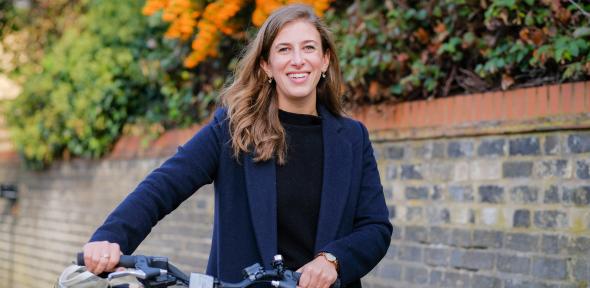
Kelsey, from Boston in the United States, is a PhD candidate at Hughes Hall. Based in the Faculty of Education, her research focuses on the role of play in paediatric healthcare, with a specific interest in children’s own perspectives of play during hospitalisation.
I had spent five years in the working world between by Master’s and my PhD, and throughout that time I developed a strong conceptualisation of what I wanted to focus on for doctoral level research. Cambridge not only had an open scholarship opportunity through the Cambridge Trust and LEGO Foundation, but I also identified a supervisor that really suited my area of interest - these were the two most critical components for me in choosing where to pursue further graduate study.
I had been looking at PhD programmes for a while and was particularly interested in returning to a UK university as they tend to be more independent and project focused, as well as shorter term. My background is in psychology and child development and I was most concerned with finding a suitable research programme that would allow me to work with children.
As an undergraduate I studied Psychology at Boston University, and through that degree I had the opportunity to spend time in London on a study abroad internship programme. I interned with a Play Specialist team on a paediatric ward and it sparked my interest in working in hospitals. I started to gain a better understanding of children living their lives in hospitals, who require medical care from a very young age, and what that meant for their development and psychological health.
After graduating I went into a Master’s programme from UCL and Yale, which blended psychology, neuroscience, and child development. After completing my MSc, I moved over to work as a researcher at Boston Children’s Hospital for several years, working within their Psychiatry Department and in the hospital’s Simulation Programme.
Working in the hospital was incredibly meaningful and inspiring to me, and I really became invested in research around delivering medical education. At the same time, I remained interested in pursuing my doctoral degree and sought out opportunities in the UK. I applied for and was offered a scholarship, funded by the LEGO Foundation and the Cambridge Trust, at Cambridge’s Play in Education, Development & Learning (PEDAL) Centre. For a long while my focus had been primarily on psychology and medicine, but by discovering more about the PEDAL Centre and their recent research funding, specifically in the area of play and health, I started to see avenues for my research in a new light. Critically, I identified a supervisor who was invested in research in the area of play and health and who was truly supportive of fostering new ideas in this academic space that bridges play research and medicine. It has been a winding journey to get to Cambridge, but I am sure that I have ended up in the right place.
It was nerve-wracking to return to university life and academic studies after many years away. Aside from looking up information about Cambridge online while still living back home in America, I also asked to be linked up with a current PhD student in my research group. Speaking with her was invaluable - she was able to give me a first-person perspective on things that were unfamiliar to me, such as the Cambridge college system, supervisions, and PhD-level independence in academia. Living in college provided a built-in community where I was able to get to know people quickly, join activities, and identify familiar spaces, all while getting acclimated to the greater Cambridge city and my new academic life. It also meant that for that first year of living abroad and getting situated in a new city, I didn’t have to worry about setting up bills or finding a flat from the other side of the Atlantic.
When working toward your PhD at Cambridge you are encouraged to foster your research skills and become an independent researcher. I benefit from immense amounts of support from my two research supervisors, as well as general academic support and resources from the Faculty of Education. This was particularly important during the pandemic and lockdown. It was undoubtedly a challenging time in many ways, but with the resources provided by my research group and the Faculty, I was able to pivot my research goals and timelines to adjust to the new reality, and feel like my physical and personal wellbeing were being cared for alongside my academic adjustments.
Cambridge is very different to Boston (and the other Cambridge, Massachusetts), but I have really come to love this little city. Being able to explore the beautiful colleges and walk around such historic and picturesque architecture, is mindblowing – especially coming from America. It’s such a beautiful and intimate place to be. There’s a beauty to being in a small city; you can conceivably try every pub, restaurant, café, or park within the city parameters and truly get to know your favourite places and spaces – it is really special and makes it quickly feel like home. And, because it is so simple to take a fast train right to the heart of London, you are never too far from the hustle and bustle of big city life.
